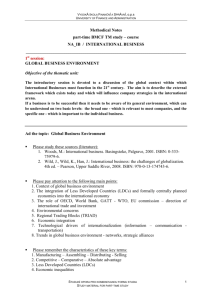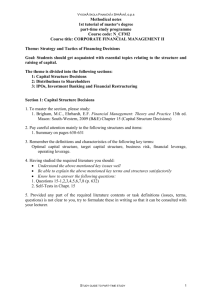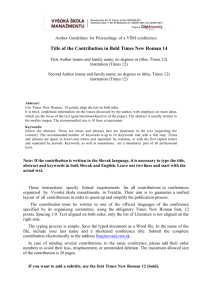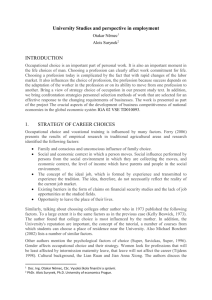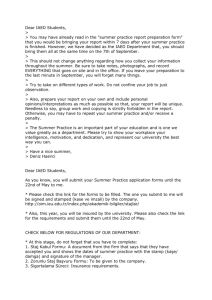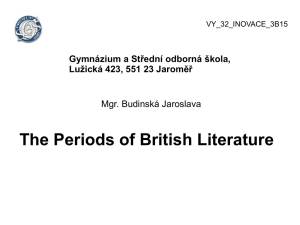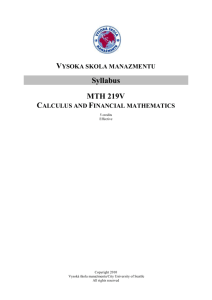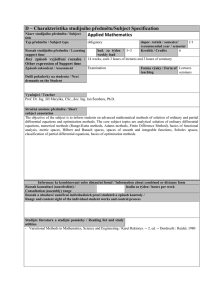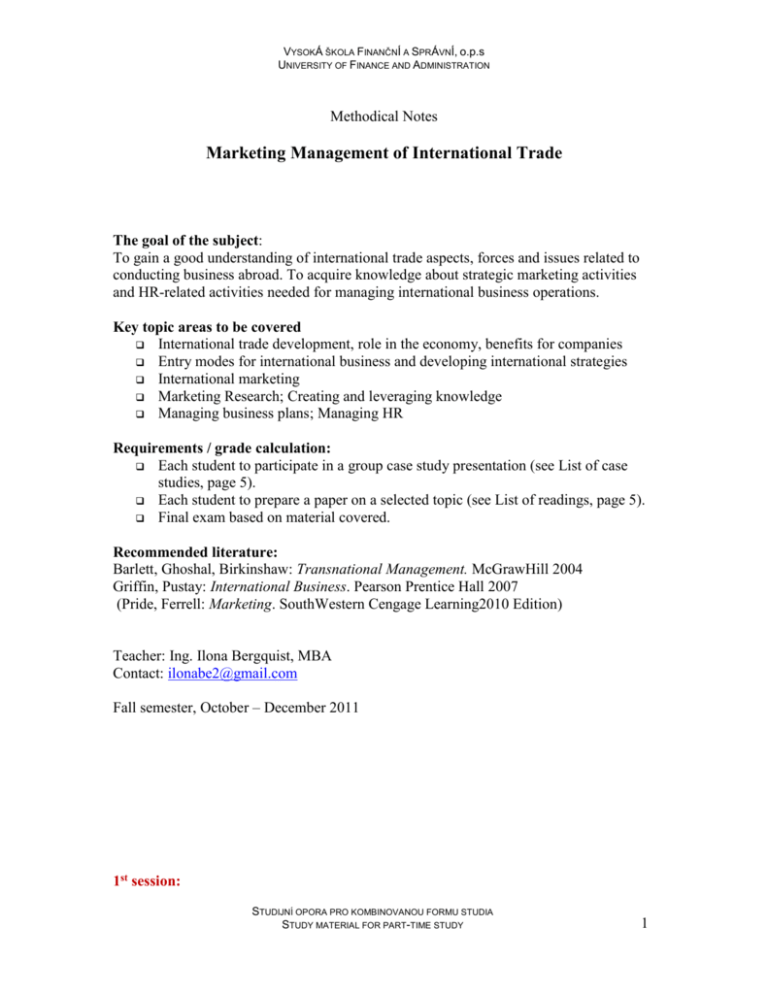
VYSOKÁ ŠKOLA FINANČNÍ A SPRÁVNÍ, o.p.s
UNIVERSITY OF FINANCE AND ADMINISTRATION
Methodical Notes
Marketing Management of International Trade
The goal of the subject:
To gain a good understanding of international trade aspects, forces and issues related to
conducting business abroad. To acquire knowledge about strategic marketing activities
and HR-related activities needed for managing international business operations.
Key topic areas to be covered
International trade development, role in the economy, benefits for companies
Entry modes for international business and developing international strategies
International marketing
Marketing Research; Creating and leveraging knowledge
Managing business plans; Managing HR
Requirements / grade calculation:
Each student to participate in a group case study presentation (see List of case
studies, page 5).
Each student to prepare a paper on a selected topic (see List of readings, page 5).
Final exam based on material covered.
Recommended literature:
Barlett, Ghoshal, Birkinshaw: Transnational Management. McGrawHill 2004
Griffin, Pustay: International Business. Pearson Prentice Hall 2007
(Pride, Ferrell: Marketing. SouthWestern Cengage Learning2010 Edition)
Teacher: Ing. Ilona Bergquist, MBA
Contact: ilonabe2@gmail.com
Fall semester, October – December 2011
1st session:
STUDIJNÍ OPORA PRO KOMBINOVANOU FORMU STUDIA
STUDY MATERIAL FOR PART-TIME STUDY
1
VYSOKÁ ŠKOLA FINANČNÍ A SPRÁVNÍ, o.p.s
UNIVERSITY OF FINANCE AND ADMINISTRATION
INTRODUCTION TO INTERNATIONAL TRADE
Objective of the thematic unit:
Understand the role of international trade in the economy; learn the benefits and risks for
companies expanding abroad.
The unit is divided into the following sections:
A. Role of international trade in the economy
B. Motivation of companies to expand abroad
Please study these sources (literature):
Barlett, Ghoshal, Birkinshaw: Transnational Management. McGrawHill 2004
Class material handed out (ppt slides)
Key topic areas:
International trade development, role in the economy
Structures of international trade – territorial and commodity
Environmental forces in global markets
Motivation of companies to expand abroad
Barriers and promotions of international trade
Key terminology and areas to learn:
International trade, liberalism, protectionalism
Environmental – legal, political, technological forces
Opportunities and barriers of international trade
International, Multinational, Global and Transnational mentality
International trade organizations
After studying the recommended literature you should be able:
To understand well the above stated main areas and explain the key terms
To answer these questions:
1. What is the role/impact of international trade on the economy of the country?
2. Why do companies expand abroad? What are the opportunities / risks?
3. What are the different expansion strategies a company can choose?
Assessment papers due: NA
Cases presentations: NA
STUDIJNÍ OPORA PRO KOMBINOVANOU FORMU STUDIA
STUDY MATERIAL FOR PART-TIME STUDY
2
VYSOKÁ ŠKOLA FINANČNÍ A SPRÁVNÍ, o.p.s
UNIVERSITY OF FINANCE AND ADMINISTRATION
2nd session:
ENTRY MODES AND STRATEGIES FOR INTERNATIONAL BUSINESS
Objective of the thematic unit:
Understand the forms of foreign market entry and approach in developing international
strategies and business plans.
The unit is divided into the following sections:
A. Forms of market entry
B. International strategies, organization models
Please study these sources (literature):
Barlett, Ghoshal, Birkinshaw: Transnational Management. McGrawHill 2004
Class material handed out (ppt slides)
Key topic areas:
Forms of market entry, advantages / disadvantages
Developing international strategies and strategic capabilities
Organizational models
Preparation of international business (external analysis of the market)
Key terminology and areas to learn:
Direct / indirect trade
Wholly owned subsidiary
Distributor, Licensing, Franchising
JV, Strategic Alliances
PEST / STEEP analysis
Research of commodity volume, competition, pricing, legal, tax and other areas
After studying the recommended literature you should be able:
To understand well the above stated main areas and explain the key terms
To answer these questions:
1. What are the forms of market entry, advantages and disadvantages of each?
2. How does a company prepare for establishing international business operations?
3. What are the different organizational models?
Assessment papers due:
1. The globalization of markets.
2. Global strategy in a world of nations.
3. Why strategic alliances?
Cases presentations: NA
STUDIJNÍ OPORA PRO KOMBINOVANOU FORMU STUDIA
STUDY MATERIAL FOR PART-TIME STUDY
3
VYSOKÁ ŠKOLA FINANČNÍ A SPRÁVNÍ, o.p.s
UNIVERSITY OF FINANCE AND ADMINISTRATION
3rd session:
INTERNATIONAL MARKETING
Objective of the thematic unit:
Understand the role of marketing in international operations and the ways of leveraging
marketing principles abroad.
The unit is divided into the following sections:
A. Role of marketing and segmentation in int’l markets
B. Applying 4 Ps in foreign operations
Please study these sources (literature):
Barlett, Ghoshal, Birkinshaw: Transnational Management. McGrawHill 2004
Griffin, Pustay: International Business. Pearson Prentice Hall 2007
Class material handed out (ppt slides)
Key topic areas:
Role of marketing in international operations
Segmentation of international markets
Product and branding strategies
Pricing and promotion strategies
Distribution strategies
Marketing communication mix
Key terminology and areas to learn:
Marketing planning process, business objectives and strategies
Positioning, USP, competitive advantage, target segments
Shopper marketing, trade marketing
Pricing – skimming / premium price / penetration price strategies
Retail chains types, EDI, RFID
Communications channels
After studying the recommended literature you should be able:
To understand well the above stated main areas and explain the key terms
To answer these questions:
1. What are the branding/pricing and distribution strategies a company can use?
2. How to best leverage communication channels abroad?
Assessment papers due:
1. Can selling be globalized? The pitfalls of global account management.
Cases presentations:
1. Acer, Inc.: Taiwan’s Rampaging Dragon
2. Nike Labor Practices
STUDIJNÍ OPORA PRO KOMBINOVANOU FORMU STUDIA
STUDY MATERIAL FOR PART-TIME STUDY
4
VYSOKÁ ŠKOLA FINANČNÍ A SPRÁVNÍ, o.p.s
UNIVERSITY OF FINANCE AND ADMINISTRATION
4th session
MARKETING RESEARCH AND SHARING KNOWLEDGE
Objective of the thematic unit:
Understand the key principles and methods in marketing research. Learn about the ways
of leveraging knowledge in the company.
The unit is divided into the following sections:
A. Marketing research methods
B. Creating and leveraging knowledge
Please study these sources (literature):
Barlett, Ghoshal, Birkinshaw: Transnational Management. McGrawHill 2004
Griffin, Pustay: International Business. Pearson Prentice Hall 2007
Class material handed out (ppt slides)
Key topic areas:
Role of marketing research, types of research
Marketing research methodologies
New trends in marketing research
Knowledge sharing
Key terminology and areas to learn:
Quantitative and qualitative research techniques
Advertising research
Concept/Product research
Loyalty research
Customer experience
Transferring knowledge
After studying the recommended literature you should be able:
To understand well the above stated main areas and explain the key terms
To answer these questions:
1. What is the role and types of marketing research?
2. How can a company learn about their target group, about their needs, satisfaction?
3. How to best share knowledge in global company?
Assessment papers due:
1. How your company can win in the knowledge economy.
Case presentations:
1. Toys ‘R Us Japan
2. Caterpillar Tractor Co.
STUDIJNÍ OPORA PRO KOMBINOVANOU FORMU STUDIA
STUDY MATERIAL FOR PART-TIME STUDY
5
VYSOKÁ ŠKOLA FINANČNÍ A SPRÁVNÍ, o.p.s
UNIVERSITY OF FINANCE AND ADMINISTRATION
5th session
MANAGING BUSINESS PLANS, HR DEVELOPMENT
Objective of the thematic unit:
Understand the process of making business plans, managing customers and employees
effectively.
The unit is divided into the following sections:
A. Creating business plan, forecasting, CRM
B. Managing human resources
Please study these sources (literature):
Griffin, Pustay: International Business. Pearson Prentice Hall 2007
Class material handed out (ppt slides)
Key topic areas:
Business plan process, forecasting
Trade receivables management
Customer management
Employee behavior in international business
Managing human resources
Key terminology and areas to learn:
Sales plan, CRM
Delivery terms
Insurance of the credits
Attitudes and perceptions across cultures
Personal prerequisites for working in int’l trade
After studying the recommended literature you should be able:
To understand well the above stated main areas and explain the key terms
To answer these questions:
1. How to best forecast business volume? What do we need to know?
2. What are the keys to successful CRM?
3. What are the key principles for successful HR management?
Assessment papers due: NA
Cases presentations:
1. McKinsey & Co: Managing Knowledge OR
P&G Japan: The SK II globalization project
STUDIJNÍ OPORA PRO KOMBINOVANOU FORMU STUDIA
STUDY MATERIAL FOR PART-TIME STUDY
6
VYSOKÁ ŠKOLA FINANČNÍ A SPRÁVNÍ, o.p.s
UNIVERSITY OF FINANCE AND ADMINISTRATION
Readings and case studies are from: Barlett, Ghoshal, Birkinshaw: Transnational
Management. McGrawHill 2004
List of readings for individual assessment papers:
Reading 1: The globalization of markets.
Reading 2: Global strategy in a world of nations.
Reading 3: Why strategic alliances?
Reading 4: How your company can win in the knowledge economy.
Reading 5: Can selling be globalized? The pitfalls of global account management.
List of case studies:
1. Acer, Inc.: Taiwan’s Rampaging Dragon
2. Toys ‘R Us Japan
3. Caterpillar Tractor Co.
4. Nike Labor Practices
5. McKinsey & Company: Managing Knowledge
6. P&G Japan: The SK II globalization project
STUDIJNÍ OPORA PRO KOMBINOVANOU FORMU STUDIA
STUDY MATERIAL FOR PART-TIME STUDY
7

